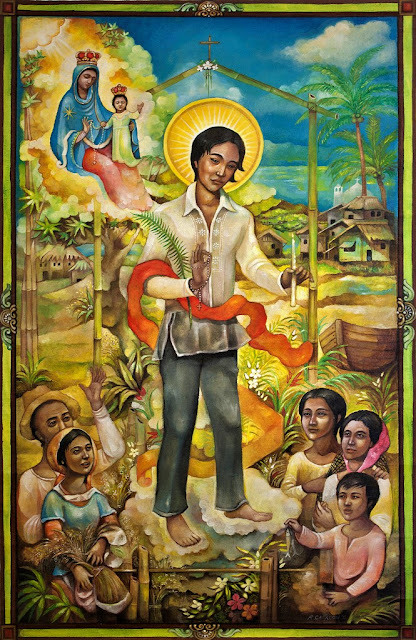[Jesus said] “When evening came, the owner of the vineyard said to his steward, `Call the laborers and pay them their wages, beginning with the last, up to the first.' And when those hired about the eleventh hour came, each of them received a denarius. Now when the first came, they thought they would receive more; but each of them also received a denarius. And on receiving it they grumbled at the householder, saying, `These last worked only one hour, and you have made them equal to us who have borne the burden of the day and the scorching heat.' But he replied to one of them, `Friend, I am doing you no wrong; did you not agree with me for a denarius? Take what belongs to you, and go; I choose to give to this last as I give to you. Am I not allowed to do what I choose with what belongs to me? Or do you begrudge my generosity?' So the last will be first, and the first last."
-St. Matthew 20:8-16
The initial reaction of many to this parable of the landowner and the workers in the vineyard is “Unfair!” Equal pay for unequal work? Unfair. When we hear it, it immediately strikes us as unfair. One group of laborers got up at the crack of dawn, but when they saw the pay-packets being handed out, they just had to speak up: "These last worked only one hour, and you’ve made them equal to us who have borne the burden of the day and the scorching heat." It seems to go against every principle of justice and fair play.
But then we get to the heart of Christ’s lesson: the landowner said, “I haven't done anything wrong to you. I paid you what you bargained for. I've met the terms of your contract, so take what belongs to you and go. It's none of your business if I choose to pay these others what I paid you. It's my money and I can do what I choose with it. Are you envious because I'm generous?”
And they were indeed envious. Who wouldn't be envious of someone who received the same wage for working only one-twelfth as long, and in the cool of the day? Even a child could figure out the injustice of that. We couldn’t imagine anyone running a business like that.
But Jesus is telling us through this parable that the Kingdom of God isn’t run along sound business principles. He says that "the last will be first and the first will be last." He seems to be saying that all our hard work, our position, our credentials, count for little with God.
God isn’t bound by our method of judging one person's worth over against another's. There is another set of criteria at work. Our relationship with God can’t be seen in purely legalistic terms. He’s cutting the ground out from under the popular idea that a person can pray enough, or sacrifice enough, or work hard enough to earn himself a place in heaven.
There are those who try to make salvation into a mathematical formula. They think that at the end of life, God simply tallies up our good deeds and our bad deeds, and then determines what our reward or punishment should be. They see God as a great scorekeeper who’ll be, by our standards, objective and fair. And, to be honest, if this were God's way of dealing with humanity, it would be unjust for the person who entered God's service at the end of life to receive the very same reward as the person who toiled and sweated all his life.
But through this parable, Jesus is teaching His disciples that God isn’t just a dispassionate scorekeeper tallying up losses and gains; rather, God is also a caring Father concerned with our well-being. God is not a judging tyrant doling out rewards and punishments. He’s a loving Saviour offering abundant life, now and eternally.
And that’s very good news, because – let’s face it – we’re much better off if we’re not being judged on the basis of what we deserve. If we really think about it, we’re probably more like the workers who showed up toward the end of the day than those who began at dawn and worked diligently all day long. There are so many things that we meant to do, but never got around to doing; and so many things that we intended not to do, but did anyway. In reality, we’re probably somewhere toward the back of the line.
Thank goodness, God is not fair. God is merciful.
When Jesus went to the Cross, He didn’t ask what the world deserved; rather, He gave what the world needed. When we receive the Body and Blood of the Lord in the Holy Eucharist, God doesn’t ask whether we deserve to receive this gift of Himself. God doesn’t ask whether we should receive only a small portion of salvation. The body and blood of Christ is offered to us in full measure. No matter whether we've known the joy of working in God's kingdom most of our lives or whether we’ve just accepted the invitation, the fullness of God's love in Jesus Christ is poured out as a reward for us all, and it is that reward which is the only thing we need.
Keep, we beseech thee, O Lord, thy Church with thy perpetual mercy: and, because the frailty of man without thee cannot but fall; keep us ever by thy help from all things hurtful, and lead us to all things profitable to our salvation; through Jesus Christ thy Son our Lord, who liveth and reigneth with thee, in the unity of the Holy Spirit, ever one God, world without end. Amen.
----------------------------
Painting: "Parable of the Workers in the Vineyard"
by Johann Christian Brand (1722-1795)
submitted to the Vienna Academy in 1769















